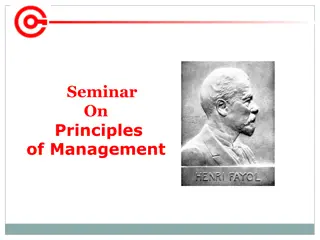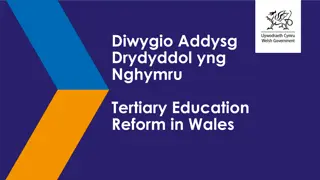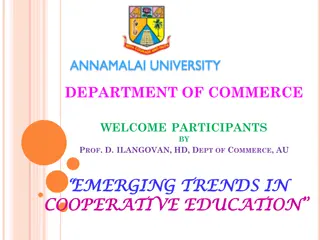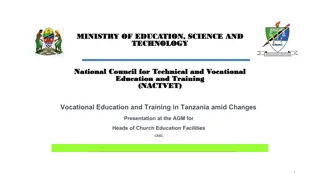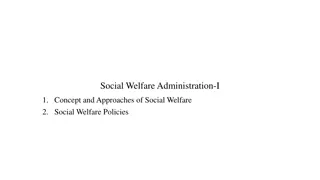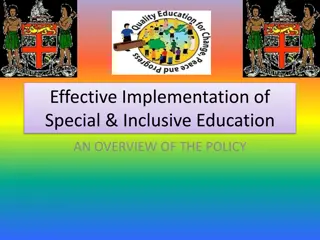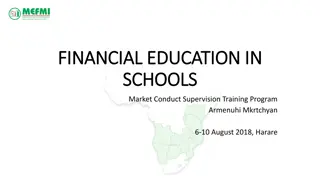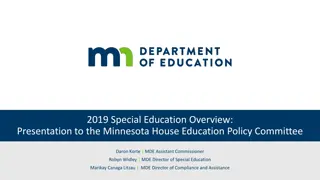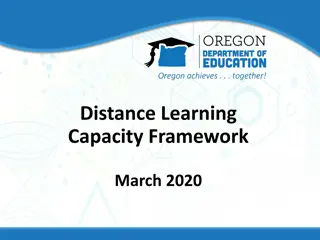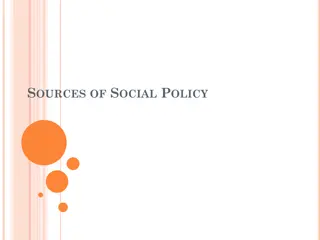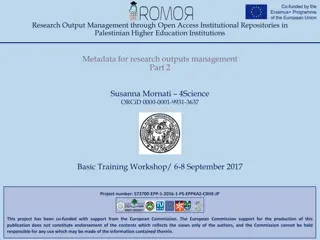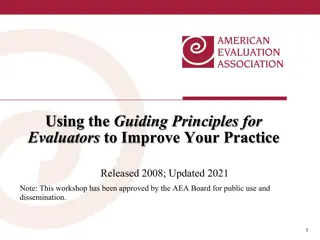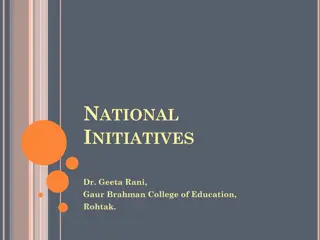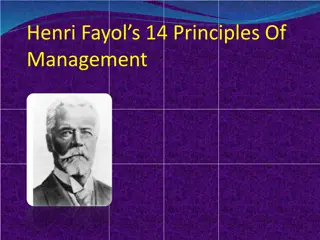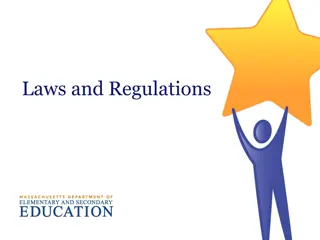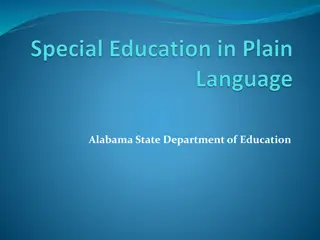SACE Teachers Conference: Enhancing Professional Development in Education
The SACE Teachers Conference focuses on improving teacher education through developing a National Framework for Teacher Education in SA. The Ministerial Committee on Teacher Education aims to create a coordinated system for both initial and continuing professional education. Recommendations include
1 views • 34 slides
Principles of the Ghana Civil Service Code of Conduct
The Code of Conduct for the Ghana Civil Service, outlined by Elizabeth Obeng-Yeboah, emphasizes principles such as abiding by the constitution and laws with dignity, integrity, and professionalism. It sets standards for conduct, avoiding conflicts of interest, maintaining political neutrality, and u
1 views • 34 slides
Principles of Education: Understanding the Meaning and Concepts
Education plays a vital role in shaping individuals and societies, fostering confidence, hope, and positive change. It encompasses a broad spectrum from imparting knowledge to personal growth and lifelong development. The etymological roots of education reflect concepts of discipline and knowledge.
5 views • 6 slides
Academic Freedom and Shared Governance in Higher Education
Academic Freedom and Shared Governance are foundational principles advocated by the American Association of University Professors (AAUP) to ensure educators have the freedom to explore, research, teach, and discuss without censorship. These principles empower educators to enhance student learning an
0 views • 9 slides
Essential Principles of Management Discussed in Seminar
Explore the foundational principles of management discussed in a seminar on principles of management. Delve into topics such as division of work, authority, discipline, unity of command, and unity of direction as outlined by Henri Fayol. Gain insights into the importance of these principles for effe
0 views • 22 slides
Tertiary Education Reform in Wales: The Future of Learning
The Tertiary Education and Research (Wales) Act aims to establish the Commission for Tertiary Education and Research (CTER) to oversee strategy, funding, and supervision of post-compulsory education in Wales. This legislation dissolves the Higher Education Funding Council for Wales (HEFCW) and focus
3 views • 20 slides
International Law of War: Nuremberg Principles and Accountability
The Nuremberg Principles, derived from the trials of Nazi officials for war crimes, establish accountability in international law. These principles hold individuals responsible for committing acts considered crimes under international law, regardless of their position or orders received. The assumpt
2 views • 22 slides
Emerging Trends in Cooperative Education: A Comprehensive Overview by Prof. D. Ilangovan, HD
Welcome to the Department of Commerce where Prof. D. Ilangovan shares insights on emerging trends in cooperative education. Education and training are vital for the success of cooperative movements, aiming to educate members and leaders on cooperative principles and practices. The focus is on cooper
0 views • 16 slides
Promoting Ethical Principles in Social Science Research
Explore the challenges and strategies for translating and applying ethical principles, especially in emergency contexts. Learn key questions in social science research and how to ensure information contributes to community actions. Understand the importance of considering ethical principles in all w
0 views • 21 slides
Enhancing Capacity of Church Education Facilities for Education Transformation
The National Council for Technical and Vocational Education and Training (NACTVET) in Tanzania is focused on enhancing the capacity of church education facilities to implement ongoing education transformation. The presentation outlines the structure of Vocational Education and Training (VET) in Tanz
0 views • 21 slides
Embedding Education for Sustainable Development in the Curriculum: The Scottish College Project
Embedding Education for Sustainable Development (ESD) in the curriculum is crucial for meeting current needs without compromising the ability of future generations to meet their own needs. The concept of sustainable development encompasses social, environmental, and economic elements. Education for
6 views • 20 slides
Importance of the Right to Education in Social Welfare Policies
The right to education is a fundamental human right recognized in various international conventions and laws. It includes provisions for free, compulsory primary education, accessible secondary education, and equitable higher education. Upholding this right is crucial for promoting equality, fosteri
0 views • 19 slides
Study Guide for Principles of Management Course at Africa Research University (ARU)
Welcome to Africa Research University (ARU)! This study guide is designed to help you navigate through the Principles of Management course (Course Code: PRM4) at ARU. It provides an introduction to the course content, emphasizing the importance of developing management skills to effectively lead and
1 views • 40 slides
Key Principles of Insurance Explained with Visuals
Understanding the principles of insurance is crucial for both insurance seekers and companies. The principles include Utmost Good Faith, Insurable Interest, Indemnity, Contribution, and Subrogation. These principles ensure transparency, fairness, and protection for policyholders. Visual representati
0 views • 6 slides
Principles of Training: Overload, Specificity, and Progression
Principles of training encompass overload, specificity, and progression. Overload requires doing more than usual, specificity involves tailored activities, and progression ensures gradual advancement. These principles are vital for improving fitness levels safely and effectively, emphasizing the nee
8 views • 17 slides
Effective Implementation of Special & Inclusive Education Policy Overview
Providing an overview of the effective implementation of special and inclusive education policy, this content discusses inclusive education, special education, traditional education systems, historical dissatisfaction with dual systems, and the importance of the policy for children with special need
0 views • 29 slides
Financial Education Integration in Schools: Strategic Decisions and Principles
Explore the importance and process of integrating financial education in school curriculums, focusing on strategic decisions and principles such as stakeholder involvement, sustainability, age groups, and impact evaluation. Learn about the necessity of introducing financial education at a young age
0 views • 44 slides
Overview of the French Education System: Historic Perspectives, Main Steps, and Governance
Historic perspectives trace the evolution of the French Education System from private to public and secular. The main steps outline compulsory education stages from nursery to high school and higher education. The system is structured around freedom, centralization, and autonomy principles, with mor
0 views • 14 slides
Duke Kunshan University - Transformative Liberal Arts Education in China
Duke Kunshan University offers a unique liberal arts education experience with a focus on globalism, shared principles, and key structural features. With a close faculty-student connection, it aims to cultivate informed and engaged citizens while providing opportunities for innovative learning. The
0 views • 14 slides
Special Education Overview Presentation to Minnesota House Education Policy Committee
Presentation to the Minnesota House Education Policy Committee on Special Education Overview, including information on the Individuals with Disabilities Education Act (IDEA), IDEA Part B and Part C services, and guidelines for children with disabilities. The presentation covers key aspects such as f
0 views • 29 slides
Distance Learning Capacity Framework & Guiding Principles for Online Education
The Distance Learning Capacity Framework and Guiding Principles for online education emphasize safety, wellness, equity, and innovation in the educational process. It stresses the importance of connectivity, technology, educator efficacy, and student proficiency in online learning. These principles
0 views • 11 slides
Effective Partnership and Mutual Accountability in Nutrition Clusters
The content discusses the minimum commitments needed for participation in Nutrition Clusters, explains the Principles of Partnership, and explores how these principles can enhance coordination and accountability to affected populations. It emphasizes partner commitments, such as leadership, mainstre
0 views • 7 slides
Importance of Mothers in Early Childhood Education
Mothers play a crucial role in early childhood education, especially in developing countries where many children lack access to formal education. Studies show a strong link between a mother's education level and the time she invests in her child's learning. By examining a 1997 education reform, rese
0 views • 8 slides
Insights on Higher Education and Latinos in California - March 2018
This data analysis focuses on higher education trends among Latinos in California, highlighting factors such as intention of higher education, family history, and awareness of education options. It reveals that over 40% of Hispanic intenders are the first generation in their family to enroll in high
0 views • 31 slides
Overview of Fundamental Principles of Space Law and Outer Space Treaties
The content discusses the fundamental principles of space law highlighted at the United Nations Space Law Conference 2020, focusing on key treaties such as the Outer Space Treaty of 1967 and associated rights, duties, and obligations of states in space exploration and use, including non-appropriatio
0 views • 16 slides
Overview of Directive Principles of State Policy in Indian Constitution
Directive Principles of State Policy (DPSP) in the Indian Constitution encompass social, economic, and political programs aimed at realizing ideals of justice, liberty, equality, and fraternity. They are non-justiciable but guide the state in legislative matters. Classified into Socialistic, Gandhia
0 views • 24 slides
Understanding FAIR Principles in Biomedical Research
The FAIR principles - Findable, Accessible, Interoperable, and Reusable - provide a framework for ensuring scientific data in biomedical research is managed and shared effectively. This informative session delves into the theory and practice of FAIR principles, emphasizing the importance of data qua
0 views • 28 slides
The FAIR Principles for Data Management and Stewardship
Embrace the FAIR principles - Findable, Accessible, Interoperable, Re-usable - for effective scientific data management and stewardship. Learn how annotations enhance data FAIRness and the key attributes of each principle. Dive into the high-level guiding principles that ensure data is globally uniq
0 views • 25 slides
Research Output Management in PS Higher Education: FAIR Metadata Principles
Research output management in higher education focuses on making scholarly output findable, accessible, interoperable, and reusable through the implementation of FAIR metadata principles. The digital ecosystem surrounding scholarly publications faces barriers like fragmented repositories, varied app
0 views • 22 slides
Understanding the Guiding Principles for Evaluators
This content provides insights into the Guiding Principles for Evaluators, including their history, assumptions, and key principles such as Systematic Inquiry and Competence. The workshop aims to increase knowledge about ethical evaluation practices and stimulate discussions within the evaluation co
0 views • 22 slides
Guiding Principles for GETSI/INTEGRATE Webinar – Materials Development and Goals
The webinar presented by David Steer from the University of Akron focuses on guiding principles for material development in the context of GETSI/INTEGRATE modules. It outlines goals for the session, including discussing components of the guiding principles, examples of meeting those principles, and
0 views • 13 slides
Evolution of Inclusive Education Policy in India
The evolution of inclusive education policy in India can be traced back to the initiatives of the Indian Education Commission and the Kothari Commission in the 1960s. These commissions highlighted the importance of providing education to children with disabilities within the general education system
0 views • 14 slides
Exploring Trauma-Informed Pedagogy in Education
The content delves into Trauma-Informed Pedagogy, an emerging approach in education particularly relevant during the COVID-19 era. It discusses core principles, the link to trauma-informed care, and offers insights from a literature review. Key points include recognizing the impact of stress on lear
0 views • 17 slides
Embracing Responsible Management Education at CBPA through PRME Initiative
The College of Business and Public Administration (CBPA) at California State University, San Bernardino commits to integrating sustainability values and responsible management education principles through the Principles for Responsible Management Education (PRME) initiative. PRME aims to foster ethi
0 views • 11 slides
Understanding Henri Fayol's 14 Principles of Management
Henri Fayol, the Father of Modern Management, introduced 14 Principles of Management in 1916, outlining essential guidelines for effective management. These principles cover areas such as division of work, authority and responsibility, discipline, unity of command, and unity of direction. By followi
0 views • 19 slides
Principles of Management: Understanding Henri Fayol's 14 Key Principles
Explore the foundational principles of management through the lens of Henri Fayol's 14 key principles, which offer valuable insights into managerial decision-making and organizational interactions. Delve into the history of Henri Fayol, his contributions to management theory, the concept of authorit
0 views • 14 slides
Special Education Laws and Regulations in Massachusetts
Explore the laws and regulations governing special education in Massachusetts, including the Individuals with Disabilities Education Improvement Act (IDEA) at the federal level and Chapter 71B and 603 CMR 28.00 at the state level. Learn about key principles such as parent and student participation,
0 views • 12 slides
Special Education Process and Intervention Strategies in Alabama State Department of Education
Special Education Process and Intervention Strategies in Alabama's State Department of Education involve implementing intervention strategies in the general education program before referring a child for special education evaluation. The process includes referral meetings, consent for evaluation, in
0 views • 17 slides
Legal Principles of Insurance
The legal principles of insurance include indemnity, insurable interest, subrogation, and utmost good faith. These principles ensure fair compensation, financial risk protection, and honesty in insurance contracts. Understanding these principles is crucial for both insurers and policyholders to navi
0 views • 18 slides
Advancing Engineering Education: Embracing Innovation and Research
Karl A. Smith, from Purdue University, discusses advancing the practice of engineering education through innovative practices, research, and embracing engineering principles. The focus is on cultivating a loop between research and practice while exploring Rigorous Research in Engineering Education (
0 views • 54 slides




